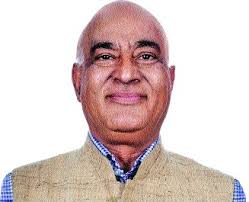Synchronised elections, voter behaviour, and governance outcomes
An active policy proposal of the Government of India is to hold national elections at the same time as the assembly elections of all the states. This article examines whether holding national and stat...
-
 Vimal Balasubramaniam
Vimal Balasubramaniam  Sabyasachi Das
Sabyasachi Das  Apurav Yash Bhatiya
Apurav Yash Bhatiya  28 August, 2020
28 August, 2020
- Articles
Political determinants of newspaper markets in India
Newspapers are an important source of political information for Indian voters. This article looks at how political factors influence the newspaper market. Using the announcement of delimitation in the...
-
 Julia Cagé
Julia Cagé  Guilhem Cassan
Guilhem Cassan  Francesca R. Jensenius
Francesca R. Jensenius  23 November, 2023
23 November, 2023
- Articles
A proposal for public funding of elections and political parties in India
The Finance Minister of India recently introduced measures aimed at cleaning up political party funding in the country. In this article, Gowda and Santhosh highlight the limitations of these measures,...
-
 M.V. Rajeev Gowda
M.V. Rajeev Gowda  Varun Santhosh
Varun Santhosh  21 April, 2017
21 April, 2017
- Perspectives
Introduction to e-Symposium: The architecture of affirmative action
The Supreme Court of India recently upheld an amendment that excluded Scheduled Castes, Scheduled Tribes and Other Backwards Classes from the Economically Weaker Section (EWS) quota, restricting it on...
-
 Parikshit Ghosh
Parikshit Ghosh  12 December, 2022
12 December, 2022
- Symposium
Design choices for implementing affirmative action
In this expository piece, Ashutosh Thakur explains the various ways in which affirmative action policies can be implemented, and discusses the underlying tradeoffs and issues at hand. He delineates th...
-
 Ashutosh Thakur
Ashutosh Thakur  12 December, 2022
12 December, 2022
- Perspectives
Panchsutras for carrying out a successful Governance Transformation
Following his last piece, which put forth a Governance Matrix that could be used assess a government system’s readiness to drive outcomes, Gaurav Goel puts forth five principles, or panchsutras, whi...
-
 Gaurav Goel
Gaurav Goel  09 December, 2022
09 December, 2022
- Perspectives
The panchayat asset register: An instrument to conserve India’s commons
With common lands making up nearly a quarter of Indian territory, the State has taken steps to protect them from encroachment. The Indian Constitution grants panchayats custodial rights to protect vil...
-
 Pooja Chandran
Pooja Chandran  Subrata Singh
Subrata Singh  07 December, 2022
07 December, 2022
- Perspectives
The Governance Matrix: Understanding a system’s readiness for change
To explain the gap between the expectation of perfect outcomes and the reality of an imperfect system, Gaurav Goel puts forth The Governance Matrix, a tool which can be used to assess the readiness of...
-
 Gaurav Goel
Gaurav Goel  02 December, 2022
02 December, 2022
- Perspectives
Time in office and gender gap in dishonesty: Evidence from local politics
Existing literature associates a higher share of women in politics with lower corruption; honesty is viewed as an inherent or static character trait. However, using information collected from 400 elec...
-
 Ananish Chaudhuri
Ananish Chaudhuri  Vegard Iversen
Vegard Iversen  Francesca R. Jensenius
Francesca R. Jensenius  Pushkar Maitra
Pushkar Maitra  16 November, 2022
16 November, 2022
- Articles
Party preferences and strategic voting in India
In the absence of compelling information that would allow them to accurately predict election outcomes in their constituency, many voters believe that their preferred candidate will win. Looking at vo...
-
 Oliver Heath
Oliver Heath  Adam Ziegfeld
Adam Ziegfeld  06 October, 2022
06 October, 2022
- Articles
Electricity Act amendment: The need for a cautious approach
The recently proposed amendment to the Electricity Act, 2003 comes after nearly two decades with few legislative changes. In this post, Dixit and Josey review electricity sector developments, especial...
-
 Shantanu Dixit
Shantanu Dixit  Ann Josey
Ann Josey  23 September, 2022
23 September, 2022
- Perspectives
The WhatsApp effect: Evidence on political engagement, preferences and polarisation
In recent years, political parties in India have increasingly leveraged WhatsApp as a tool to reach voters, raising concerns about the influence of social media on the democratic process. This article...
-
 Kevin Carney
Kevin Carney  16 August, 2022
16 August, 2022
- Articles
Demographic and development outcomes of administrative proliferation
This creation of new administrative districts by splitting existing districts is a frequent occurrence in India, where the number of districts has more than doubled in the last four decades. Looking a...
-
 Deepak Malghan
Deepak Malghan  Jothsna Rajan
Jothsna Rajan  08 August, 2022
08 August, 2022
- Articles
Do value-added taxes benefit firms? Evidence from the adoption of state-specific value-added taxes
Value-added tax (VAT) systems have grown popular in the last 30 years, especially among developing countries looking for ways to raise tax revenue efficiently. Using 2000-2012 data on product, state-s...
-
 David Agrawal
David Agrawal  Laura Zimmermann
Laura Zimmermann  25 May, 2022
25 May, 2022
- Articles
Private returns to bureaucratic appointments: Evidence from financial disclosures in India
Bureaucrats often face rigid salary structures, and face low-powered incentives that have less wage differentiation based on performance. Using bureaucrats’ self-reported asset declarations from the...
-
 Amit Chaudhary
Amit Chaudhary  Song Yuan
Song Yuan  28 April, 2022
28 April, 2022
- Articles
Twitter feed
Tweets by Ideas4IndiaMost Popular Governance Posts
Unique Health Identification and Aadhaar: A case for mandatory linkage
As part of the Digital India initiative, All India Institute of Medical Sciences (AIIMS) issues a Unique Health Identification (UHID) number to each patient, which documents their entire journey in th...
 Mudit Kapoor
Mudit Kapoor  23 December, 2016
23 December, 2016
- Perspectives
Caste dominance in rural India: Cause and effect
Rural India remains a caste-based society. This column explores why caste continues to play such an important role and what the effects are. It argues that trade and agricultural productivity suffer, ...
 Siwan Anderson
Siwan Anderson  16 August, 2012
16 August, 2012
- Articles
Why did the Indian economy stagnate under the colonial rule?
How did the Indian economy fare under the colonial rule? Is the average Indian significantly better off after Independence? This column examines trends in GDP per capita in order to determine the stan...
 Aniruddha Bagchi
Aniruddha Bagchi  16 September, 2013
16 September, 2013
- Articles





 16 November, 2023
16 November, 2023






